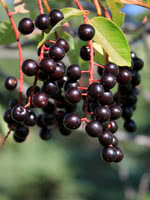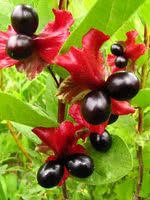Mon-Fri 9am - 5pm Mountain time
Western Chokecherry vs Bracted Honeysuckle
Prunus virginiana var. demissa
Lonicera involucrata
NOT AVAILABLE THIS SEASON - MIGHT RETURN
Western Chokecherry is a shrub or small tree commonly used for farmstead and field windbreaks.
It produces white flowers in the spring and edible dark purple fruit that matures between September and October. Its cherries are great for making for making jams, jellies or wine, but are not very palatable for raw eating.
Bracted Honeysuckle is a shade loving shrub that is distinguishable from other honeysuckles by its square stem and pointed leaves. Native to most of North America, this honeysuckle is found along swamps, rivers, riparian zones and moist wooded areas.
If you have a erosion control project in mind, consider Bracted Honeysuckle.
Western Chokecherry Quick Facts
Bracted Honeysuckle Quick Facts
Toxicity: toxic to horses, cattle, etc.)

